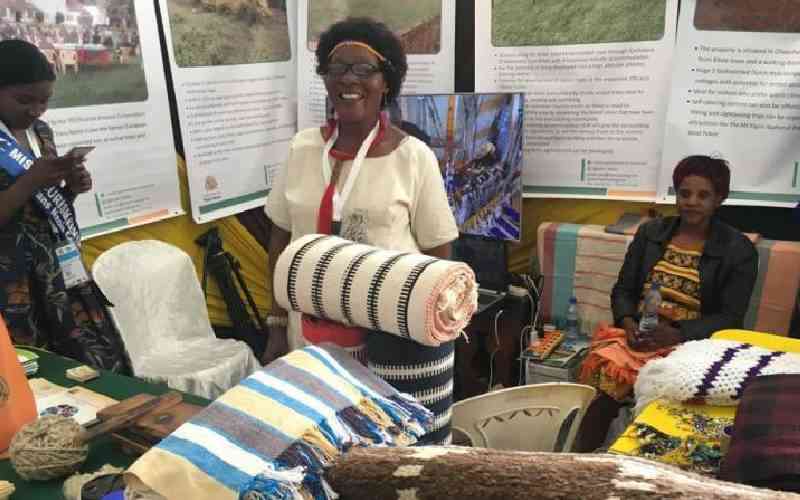
Getrude Khisa displays assorted fabric in her textile shop in Kitale town. [Martin Ndiema, Standard]
The light shines through a glass window from a tiny shanty opposite the Kitale National Polytechnic in Trans Nzoia until the early hours of the morning.
The room is stunning, with shukas, scarves, and mats, among other traditional attires, lined up on the table and on shelves attached to the walls.
Gertrude Khisa is the owner and director of Umak, a cottage industry known for its elegant fabrics that have received accolades both locally and internationally.
"I have a small task force, but the job is well-paying and does not require extensive academic knowledge. I continue to recruit young people and encourage them to work in the handicraft industry rather than looking for white-collar jobs that do not exist," she says.
She gets up around 5.30am and does her housework before going to work.
By 8am, all of her coworkers, Joseph Odhiambo, an instructor, and three middle-aged women, have arrived at their small workstation, ready for the day's tasks.
Khisa's business is small, but she has a Herculean task of meeting her clients' demands because she receives a plethora of orders to supply various types of garments.
The mother of five has been in the field for six years, earning her daily bread from the handcrafting business as she uses creativity to attract a larger clientele.
During this time and on various occasions, she was able to showcase her products in various exhibitions, including internationally, where she sold a number of them at a profit.
She once travelled to Rwanda to compete in an East African competition for locally made garments, where she won several awards for her outstanding performance.
She has been able to exhibit her products at all of the devolution conferences held across the country, as well as other trade fairs, on a local level.
Mercy Boso, a crafts trainee, is very enthusiastic about the field of enterprise and hopes to join his father, who makes military garments, after completing her course.
"I used to mend handbags for students at school and earn money in exchange to fund my stay. I got here because the little creativity inspired me. I want to improve my skills and work alongside my father. In the future, I would like to start my own business," explains the 24-year-old.
She says the need to maintain her school life, and thus her father's work inspired her greatly.
Odhiambo trains young people who come to the enterprise to learn handicraft skills. Boso has been his student for three months, and he describes the young woman as passionate and hardworking.
"Many people struggle to find white-collar jobs when real money is available. Consider getting paid to do something you enjoy. I adore this craft and hope to reach greater heights with it."
Odhiambo, who used to work at Kahawa Barracks making military uniforms, says he left after a good stint and has now returned to help the youth who need such skills.
"I train for free just to support them, and we invite anyone who wants to join us. Khisa pays me Sh1,000 per day here, which is a lot of money. Jua Kali is the place to be because it pays well," Odhiambo said.
Khisa anticipates that at least 200 youths will be trained in the cottage industry. She does, however, mention that the Covid-19 pandemic forced her to lay off six of her employees because the business had slowed.
Khisa, on the other hand, is now urging farmers and agricultural corporations to produce more yarn and wool, citing the importance of these raw materials in the cottage industry.
The small business is a valuable heritage because it decorates the country with exquisitely crafted fabrics.
Simon Kisigei, County Executive for Trade, says the department has since prioritised support for smallholder enterprises to help them grow.
 The Standard Group Plc is a multi-media organization with investments in media platforms spanning newspaper print
operations, television, radio broadcasting, digital and online services. The Standard Group is recognized as a
leading multi-media house in Kenya with a key influence in matters of national and international interest.
The Standard Group Plc is a multi-media organization with investments in media platforms spanning newspaper print
operations, television, radio broadcasting, digital and online services. The Standard Group is recognized as a
leading multi-media house in Kenya with a key influence in matters of national and international interest.

